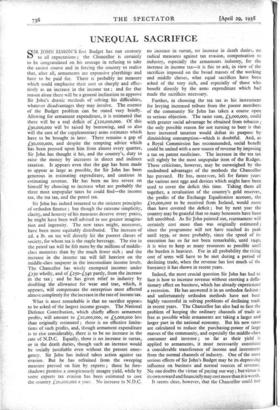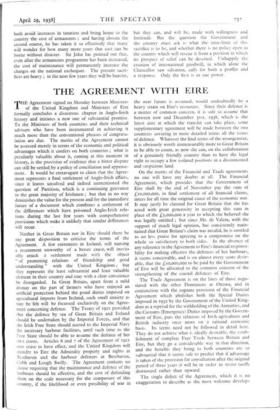UNEQUAL SACRIFICE
SIR JOHN SIMON'S first Budget has run contrary to all expectations ; the Chancellor is certainly to be congratulated on his courage in refusing to take the easiest course and in forcing the country to realise that, after all, armaments are expensive playthings and have to be paid for. There is probably no measure which could emphasise their cost so sharply and effec- tively as an increase in the income tax ; and for that reason alone there will be a general inclination to approve Sir John's drastic methods of solving his difficulties, whatever disadvantages they may involve. The essence of the Budget problem can be stated very briefly. Allowing for armament expenditure, it is estimated that there will be a real deficit of £120,000,000. Of this L9o,000,000 will be raised by borrowing, and so also will the cost of the supplementary arms estimates which have to be brought in later. There remains a gap of L30,000,000, and despite the tempting advice which has been pressed upon him from almost every quarter, Sir John has thought it his, and the country's, duty to raise the money by increases in direct and indirect taxation. It appears even that the gap has been made to appear as large as possible, for Sir John has been generous in estimating expenditure, and cautious in estimating revenue. He has been no less severe on himself by choosing to increase what are probably the three most unpopular taxes he could find—the income tax, the tea tax, and the petrol tax.
Sir John has indeed returned to the strictest principles of orthodox finance ; but though the extreme simplicity, clarity, and honesty of his measures deserve every praise, he might have been well advised to use greater imagina- tion and ingenuity. The new taxes might, moreover, have been more equitably distributed. The increase of 2d. a lb. on tea will directly hit the poorest classes of society, for whom tea is the staple beverage. The rise in the petrol tax will be felt more by the millions of middle- class motorists than by the much fewer rich ; and the increase in the income tax will fall heaviest on the middle-class taxpayer in the intermediate income levels. The Chancellor has wisely exempted incomes under £250 wholly, and of £250454o partly, from the increase in the tax ; and he has given relief to industry by doubling the allowance for wear and 'tear, which, it appears, will compensate the enterprises most affected almost completely for the increase in the rate of income tax.
What is most remarkable is that no sacrifice appears to be asked of the largest income groups. The National Defence Contribution, which chiefly affects armament profits, will amount to L20,000,000, Or jC5,000,000 less than originally estimated ; there is no effective limita- tions of such profits, and, though armament expenditure is to rise considerably, there is to be no increase in the rate of N.D.C. Equally, there is no increase in surtax, or in the death duties, though such an increase would be socially justifiable even without the present emer- gency. Sir John has indeed taken action against tax evasion. But he has refrained from the sweeping measure pressed on him by experts ; those he fore- shadows promise a conspicuously meagre yield, while by some experts tax evasion has been estimated to cost the country L20,000,000 a year. No increase in N.D.C. no increase in surtax, no increase in death duties, no radical measures against tax evasion, compensation to industry, especially the armaments industry, for the increase in income tax—it is fair to ask, in view of the sacrifices imposed on the broad masses of the working and middle classes, what equal sacrifices have been asked of the very rich, and especially of those who benefit directly by the arms expenditure which had made the sacrifices necessary.
Further, in choosing the tea tax as his instrument for levying increased tribute from the poorer members of the community Sir John has taken a course open
to serious objection. , The same sum, L3,000,000, could with greater social advantage be obtained from tobacco ; the only possible reason for not turning to beer is that here increased taxation would defeat its purpose by diminishing consumption—which is doubtful. And, as a Royal Commission has recommended, social benefit could be united with a new source of revenue by imposing a tax on patent medicines. The increase in the tea tax will rightly be the most unpopular item of the Budget. These criticisms, however, may be outweighed by the undoubted advantages of the methods the Chancellor has pursued. He has, moreover, left for future years the various nest eggs and devices which might have been used to cover the deficit this time. Taking them all together, a revaluation of the country's gold reserves, the profits of the Exchange Equalisation account, the £ro,000,000 to be received from Ireland, would more than have covered the deficit ; but by next year the country may be grateful that so many henroosts have been left unrobbed. As Sir John pointed out, rearmament will certainly cost more than was originally estimated ; since the programme will not have reached its peak until 1939, or more probably, since the speed of its execution has so far not been remarkable, until 1940, it is wise to keep as many resources as possible until the burden is heaviest. For in all probability the rising cost of arms will have to be met during a period of declining trade, when the revenue has lost much of thc buoyancy it has shown in recent years.
Indeed, the most-crucial question Sir John has had to face is how to increase revenue without exerting a defla- tionary effect on business, which has already experienced a recession. He has answered it in an orthodox fashion ; and unfortunately orthodox methods have not been highly, successful in solving problems of declining trade in recent years. The Chancellor has also had to face the problem of keeping the ordinary channels of trade as free as possible while armaments are taking a larger and larger part in the national economy. But his new taxes are calculated to reduce the purchasing-power of large masses of the community, and especially the middle-class consumer and investor ; so far as their yield is applied. to armaments, it must necessarily constitute a considerable transference of income and investment from the normal channels of industry. One of the most serious effects of Sir John's Budget may be its depressing influence on business and normal sources of revenue. No one doubts the virtue of paying our way; but virtue is its own reward and financiallymay cost more than it is worth.
It seems clear, however, that the Chancellor could not both avoid increases in taxation and bring home to the country the cost of armaments ; and having chosen the second course, he has taken it so effectively that many will wonder for how many more years that cost can be borne without disaster. Sir John has pointed out that, even after the armaments programme has been increased, the cost of maintenance will permanently increase the charges on the national exchequer. The present sacri- fices are heavy ; in the next few years they will be heavier, but they can, and will be, made with willingness and fortitude. But the question the Government and the country must ask is what the time-limit of this sacrifice is to be, and whether there is no policy open to the country which will rescue it from a position in which no prospect of relief can be descried. Unhappily the creation of international goodwill, in which alone the Chancellor saw salvation, calls for both a proffer and a response. Only the first is in our power.



























































 Previous page
Previous page